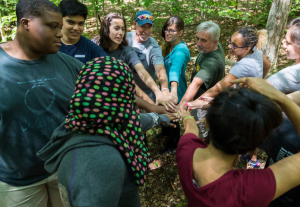What grantees need most — a partner
 For better or worse; for richer, for poorer; through sickness and health. You may not associate this vow with your typical funder — unless you’ve had the good fortune to partner with New Jersey Health Initiatives (NJHI).
For better or worse; for richer, for poorer; through sickness and health. You may not associate this vow with your typical funder — unless you’ve had the good fortune to partner with New Jersey Health Initiatives (NJHI).
Among the many things that make NJHI unique is the value it places on shifting power to communities, making longer-term commitments so that grantees have the time needed to achieve community transformation, and forming authentic relationships with grantees and partners.
NJHI was established in 1987 as a national program of the Robert Wood Johnson Foundation (RWJF). In New Jersey, RWJF’s home state, NJHI plays a leading role in advancing the foundation’s efforts to build healthier communities through grantmaking and investments. Since its inception, NJHI has supported more than forty statewide funding initiatives encompassing over five hundred grantees across all twenty-one counties in the state, making grants in support of youth-led initiatives, health and well-being, mental health, and community-based capacity development.
Recognizing that the communities it supports are best positioned to create the most impact and sustainable change, the organization strives to be flexible, nimble, and innovative. “We allow community partners to determine the best use of grant funds based on their specific community needs,” says NJHI director Bob Atkins. “We have focused our grantmaking on engaging more voices and stakeholders in the communities in which we work, and to have them inform our thinking and approaches to making their communities healthier and more equitable.”
As a community-led funder and partner focused on a single state, NJHI can make multiple investments in the same communities in ways that are strategic and complementary, rather than duplicative. “It has been exciting to see past and current grantees weave in elements of what they first received funding for five or ten or fifteen years ago,” says NJHI deputy director Diane Hagerman. “We know that changes to health outcomes may not be seen for five or even ten years, so seeing work that was funded in the past resurface in a more current context speaks to the commitment of communities to make lasting change.”
NJHI also recognizes that needs and context are not the same across communities, even within a single state. “We’ve analyzed our approach and become increasingly aware that some of our more distressed communities want help to build their own organizational and collaborative capacity,” Hagerman notes. To address those requests, NJHI increased the amount of technical assistance it provides to applicants from distressed communities, many of which don’t have a paid grant writer on staff.
More recently, a reimagining of NJHI’s approach put greater focus on how it works with communities — as opposed to for communities. “One of the most valuable roles we can play,” says Atkins, “is to set the table for grantees and community partners while they decide and create buy-in around what will help them achieve their goals.” As such, NJHI leverages its influential role as connector and convener to help its community partners expand their networks and access additional resources, including coaching and collaborative learning and networking opportunities. Such investments provide exceptional returns in terms of building capacity at the community level.
“NJHI not only invests in communities, it invests in leaders and has built a movement across the state of people passionate about health equity,” says Mary Celis, director of health initiatives at United Way of Passaic County. “Being a part of the NJHI family means you always have thought-leaders to problem-solve with and learn from.”
NJHI’s responsiveness during the COVID-19 pandemic provides another example of how it has grounded its investments in relationships. The large number of coronavirus infections and deaths in the state have underscored the important policy and systems work NJHI grantees do to address health disparities in their communities. NJHI was quick, for example, to provide timely funding resources and other critical information to grantees, and it devoted its April monthly Learning Collaborative session to an open discussion about the impacts of the COVID-19 pandemic in grantee communities. It was reassuring for NJHI grantees and partners to hear a funder be transparent about the ways in which the crisis has impacted the work it funds, and that the funder was committed to providing maximum flexibility in terms of its current grants.
The focus on developing meaningful partnerships has been critical to NJHI’s efforts to reduce health disparities and create healthier communities in New Jersey. “This work cannot be accomplished alone or in silos,” Atkins says. “To be effective in what we are trying to achieve requires partnering with our communities and other organizations. We don’t want to simply be seen as ‘the funder’ — we are their partners, committed to learning from and alongside them.”
That strategy serves NJHI, its grantees, and their communities well — and New Jersey is a healthier state because of it.






